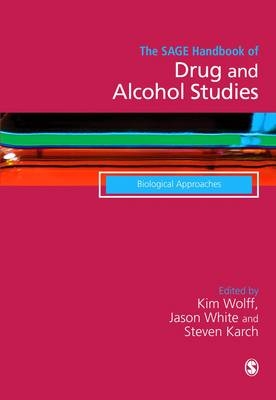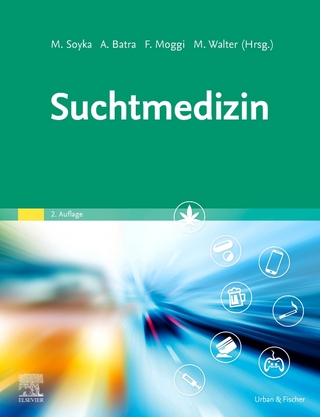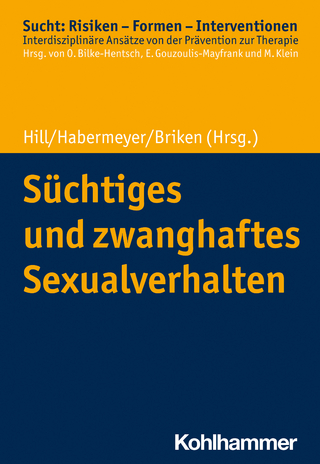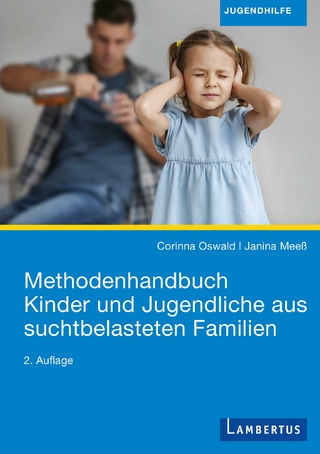
The SAGE Handbook of Drug & Alcohol Studies
SAGE Publications Ltd (Verlag)
978-1-4462-9867-1 (ISBN)
With contributions from leading international academics across the biological sciences, this handbook takes a critical look at the key contemporary issues and debates in the field. The 31 chapters are divided into four parts:
Part I Determination of Substance Misuse
Part II PK and PD in Relation to Patterns of Use
Part III Detection and Treatment of Drug and Alcohol Use
Part IV Controversies and New Approaches
This Handbook is an excellent reference text for the growing number of academics, students, scientists and practitioners in the drug and alcohol studies community, and will be a vital resource to the allied professions involved in work-place drug testing, clinical toxicology, and forensic science.
Kim Wolff is Professor of Addiction Science, at King′s College London and has worked in the Addiction field for the last 25 years. Her PhD thesis investigated the pharmacokinetics of methadone in heroin dependent drug addicts at the Research School of Medicine, University of Leeds. Professor Wolff′s main research interest is concerned with biomarkers of substance misuse and she has acted as an expert advisor to the UK Government National Treatment Agency for Substance Misuse (NTA); the National Collaborating Centre for Mental Health (NCCMH) and the National Institute for Clinical Excellence (NICE) in this regard. Her work has led to advancement in the area of biomarkers for High Risk Drinking-Drivers demonstrating the clinical efficacy of carbohydrate deficient transferrin (CDT) in high-risk drink-drivers. The findings of this research resulted in a change of national policy for the Driver Vehicle Licensing Agency (DVLA), which has made CDT the sole biomarker for use by medical practitioners to aid decision making with regard to relicensing high risk drink drivers. Professor Wolff is currently a panel member of the UK Secretary of State for Transport Medical Advisory Panel on Alcohol, Drugs & Substance Misuse & Driving. She chaired the expert Panel on drug-driving for the Department for Transport (2012) and led on the Panel′s report, which made a significant contribution to the development of the new drug driving legislation that into force in England and Wales on march 2nd 2015. Professor Wolff has edited several books and published extensively in the peer reviewed literature. In 2016 Professor Wolff was made a Member of the Most Excellent Order of the British Empire (MBE) in the New Year′s Honours list for services to road safety. Jason White is Professor of Pharmacology and Head, School of Pharmacy and Medical Sciences, University of South Australia. He has published extensively in the pharmacology of addictive drugs, particularly opioids and stimulants, and in the treatment of drug and alcohol dependence. He has experience in the management of alcohol and drug problems and in the provision of expert evidence related to drug effects in civil and criminal matters. He is currently Co-Chair of the WHO Expert Committee on Drug Dependence. Steven Karch received his undergraduate degree from brown University, in Providence, Rhode Island, in the US. He attended graduate school in anatomy and cell biology at Stanford. He received his MD from Tulane University in New Orleans, did postgraduate training in Neuropathology at the Royal London Hospital and in Cardiac Pathology, also at Stanford University. Dr Karch is a Fellow of the Faculty of Forensic and Legal Medicine of the Royal College of Physicians London. He served as a cardiac pathologist at the office of the San Francisco Medical Examiner, publishing a number of books and papers when he worked there. Dr Karch is the author of more than 200 papers and book chapters, most having to do with the effects of drug abuse on the heart. He was Forensic Science Editor for Humana Press where he edited his own book series. He sits on the editorial board of the Journal of Cardiovascular Toxicology and Minerva Medica Legal Medicine. The 5th edition of his widely used textbook, The Pathology of Drug Abuse, was released last November. He edited the first two editions of the Drug Abuse Handbook, and will be senior editor of the third edition, scheduled for publication in 2018.
Part I: Determination of Substance Misuse
1. Genetics and genomics in addiction research - Rohit Jaibhagwan Lodhi, David Rossolatos and Katherine Jean Aitchison
2. Basic Pharmacokinetics of Substance Misuse - Kim Wolff
3. Future Directions: The role of pharmacogenomics - Jason White & Andrew A. Somogyi
Part II: PK and PD in Relation to Patterns of Use
4. Alcohol: Pharmacokinetics and Pharmacodynamics - Matthew Goldin and E. Jane Marshall
5. Nicotine: The Pharmacokinetics of Nicotine and Cotinine - Noorzurani Robson
6. Opioids: A Discussion of Pharmacokinetics and Pharmacodynamics in Those Who Misuse Drugs - Verena Metz & Sandy Corner
7. Cocaine: pharmacokinetics, pharmacodynamics and addictive potential - Glenn Dumont
8. Amphetamine & Methamphetamine: Pharmacokinetics and Pharmacodynamics - Kim P.C. Kuypers, Eef Theunissen and Jan Ramaekers
9. MDMA: Pharmacokinetics - Magí Farré, Esther Papaseit & Rafael de la Torre
10. Benzodiazepines: A discussion of pharmacokinetic and pharmacodynamic effects in those who misuse the drug - Alyson Bond & Malcolm Lader
11. Ketamine: the pharmacokinetics and pharmacodynamics in medicinal and misusing populations - Kim Wolff
12. Cannabis: The pharmacokinetics and pharmacodynamics of recreational and medicinal cannabis - Dave Allsop, Richard Kevin & Jonathon Arnold
13. Synthetic cannabinoids: The pharmacokinetics and pharmacodynamics of ‘Spice’ and other synthetic cannabinoids - Deepak D′Souza & Aarti Gupta
14. Khat, Methedrone and MDPV: A discussion of pharmacokinetic and pharmacodynamic parameters - Lorenza Colzato & Manuel Ruiz
15. Gamma-hydroxybutyric Acid (GHB): A discussion of pharmacokinetic and pharmacodynamic effects of GHB including its analogues - John B. Saunders, Jason Connor & Gerald Feeney
16. Polysubstance Use - Jason Connor, John Saunders, Adrian Kelly, Gerald Feeney
Part III: Detection and Treatment of Drug and Alcohol Use
17. A brief overview of the detection of drug and alcohol use: the matching of purposes and procedures. - Kim Wolff & Michael Gossop
18. Biomarkers of alcohol misuse - Natalie E Walsham & Roy A Sherwood
19. Treatment of Opioid Dependence - Kim Wolff, Steven Karch, Jason White
20. Wastewater Analysis for the Measurement of Population Level Drug Use: Sewage-Based Epidemiology - Bram Miserez & Alexander van Nujs
Part IV: Special Settings
21. Forensic toxicology and death investigation - A Robert Forrest
22. Alcohol-related offences, alcohol use disorders and the workplace - Kim Wolff, Samantha Gross, Noor Zurani-Robson and Jane Marshall
23. Future directions: What is the way forward for toxicology and forensic research? - Steven B Karch
Part V: Controversies and New Approaches
24. Intravenous abuse of methylphenidate - Bjarni O. Rafnar and Gudrun Dora Bjarnadottir
25. Non addictive drug use: The way forward - Christian P. Müller
26. Different Approaches to setting limits for drugs and alcohol use when driving - Kim Wolff
27. Where do gambling and internet ‘addictions’ belong? The status of ‘other’ addictions - Mark D. Griffiths, Daria J. Kuss, Halley M. Pontes and Joël Billieux
28. Emerging Tobacco Trends from the Arabian Cultures (Waterpipe and Dokha): Global Prevalence, Health Risks and Propensity for Abuse - Annie Crookes
29 Treating Benzodiazepine Dependence - abstinence or maintenance? - Deborah Zador
30. ADHD: pathways into addiction, diagnosis and pharmacotherapy - Pieter-Jan Carpentier, Philip Asherson & Ulrich Muller
31. Exploratory models to explain attention deficit hyperactivity disorder and its association with substance use - Susan Young and Ottilie Sedgwick
| Erscheint lt. Verlag | 1.11.2016 |
|---|---|
| Verlagsort | London |
| Sprache | englisch |
| Maße | 174 x 246 mm |
| Gewicht | 930 g |
| Themenwelt | Medizin / Pharmazie ► Medizinische Fachgebiete ► Suchtkrankheiten |
| Sozialwissenschaften ► Soziologie | |
| ISBN-10 | 1-4462-9867-1 / 1446298671 |
| ISBN-13 | 978-1-4462-9867-1 / 9781446298671 |
| Zustand | Neuware |
| Informationen gemäß Produktsicherheitsverordnung (GPSR) | |
| Haben Sie eine Frage zum Produkt? |
aus dem Bereich


